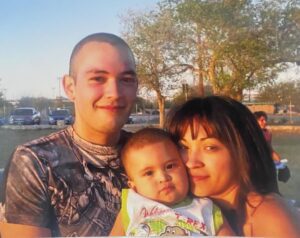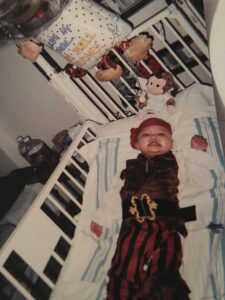At 33 years old, Cristina Urbina has built a beautiful life. Since she was younger, she always knew that she wanted to work with kids. She loves the laughter, the pure joy, and knowing that she can make a positive difference in their life. After graduating with a bachelor’s degree in occupational therapy, she spent nine years as a pediatric therapist. Cristina and her husband Raymundo opened a daycare, where Cristina is now the director. The family lives in El Paso with their two daughters Isabella, aged 6 and Allison, aged 10.
But things have not always been easy for Cristina. When she was 19 years old, she birthed her son Isaiah, a big, healthy, happy, chunky baby who was always smiling. He brought so much light and purpose to her life.

Isaiah passed away from glutaric acidemia type I (GA-1) in 2010, shortly after his second birthday. Cristina and Ray hold his memory every day. Losing Isaiah was one of the most, if not the most, difficult things that Cristina has ever dealt with. Yet his legacy lives on—in Cristina’s heart and in his story that she shares. She tells Patient Worthy:
“I want the world to know that GA-1 is not only rare, but life-threatening. It’s important for doctors to have more knowledge about this disease and for every newborn to have the screening to ensure quick detection. Kids with GA-1 can be saved when treated correctly and in time.
I also want other parents to know that they aren’t alone. I know what it feels like to spend time in the hospital enduring countless bad days. Or what it feels like to experience the ignorance, rudeness, and discrimination that sometimes comes with parenting a child with a rare disease. As parents, we are advocates for our kids. We need to speak up. I hope that Isaiah’s story can make a change.”
Cristina shared Isaiah’s story with Patient Worthy: detailing their journey with GA-1, explaining what GA-1 is (and what symptoms parents should look out for), and most of all, remembering the precious time she had with her son.
Cristina’s Story
November 12, 2008 — a day that Cristina will always remember. The day that her son Isaiah J. Perales was born. Cristina was nineteen years old and absolutely in love with her gorgeous baby boy.

Soon after Isaiah’s birth, his newborn screening panel came back as abnormal. Doctors couldn’t tell Cristina much about what was going on other than it appeared to be a metabolic disorder. She asked for repeated blood test, and this went on the first three weeks of his life. While doctors believed that he had a metabolic disorder, they could not provide a diagnosis. Says Cristina:
“It was extremely stressful. Every mother’s wish is a healthy baby. I couldn’t imagine anything that could harm my baby. I kept insisting on more tests and a diagnosis, and eventually we were referred to a metabolic specialist in El Paso. After testing, I was told that Isaiah had glutaric aciduria type 1, or GA-1. The doctor explained what it meant and what symptoms I should be aware of.”
At the time, Isaiah was the only child in El Paso diagnosed with GA-1.
Cristina was given an information pamphlet about GA-1 to understand the disease, but wanted to learn as much as she could. She suddenly found herself spending hours online, trying to uncover more answers. It was frustrating; there was only one research paper and one other story of a child with GA-1. Even though she craved answers, the future became more and more uncertain.
A Mother’s Love
Despite the diagnosis, both Cristina and her doctor were skeptical. Isaiah seemed completely healthy; he showed no symptoms for the first eight or nine months of his life. The doctor continued to monitor Isaiah with multiple blood work and doctors’ appointments. At home, Cristina loved spending all of the time she could with her son. She shares:
“He loved to take off hats specially Ray’s hat when being carried and laughed about it after. Isaiah loved to play in the water with all of his toys and splash as much water around as he could. He was such a funny loving boy and loved to wear sunglasses, eat, dance, and babble all day. His favorite cartoon was Sid the Science Kid on PBS. As soon as he heard the song, he would get excited and dropped everything to enjoy his cartoon.
He loved to be hugged and kissed by grandma and myself. He enjoyed the swing and slides in the park, running around the house in his walker, and opening all of the cabinets that he could. Every night, I sang Rudolph the Red-Nosed Reindeer as I tapped on his nose, and he smiled until he fell asleep. Isaiah lit up the room everywhere he went with his cute smile, he was just sunshine. He was one of the strongest little boys I’ve ever known. Isaiah was perfect in every way. Too perfect and beautiful for earth.”
When Isaiah was around nine months old, he experienced his first health crisis. He began having multiple seizures and had to be rushed to the hospital. Once the seizures were under control, doctors had realized seizures had done enormous damage to part of his brain, leading to loss of all motor functions.

Cristina’s bright, bubbly boy regressed; he lost his ability to sit, crawl, stand, or hold his head independently. He could no longer drink out of a bottle. As a result, doctors had to insert a gastrostomy-jejunostomy tube (G-J feeding tube). Cristina explains:
“I had to process what had happened and how I was leaving the hospital with my baby now left completely disabled from one day to another, but I also had to learn how to mix his special formula, weigh his food, handle his strict diet, and mange his feeding machine in less than three weeks as the nurse only went two times through the process.
We had multiple stays in the hospital due to problems with his low immune system, the need for new bloodwork, and side effects from the medications; the hospital soon became our second home. He did regain some of his abilities after treatment, and therapy, but he would never be the healthy boy he was, and I was okay with it. He made progress and the little things he was able to re-learn such as rolling over meant so much. I then learned how we can take many things for granted in life.”
Join us in Part 2 as Cristina shares their fight for help, how she keeps Isaiah’s memory alive, and advice for others. In Part 2, we will also discuss exactly what GA-1 is.


